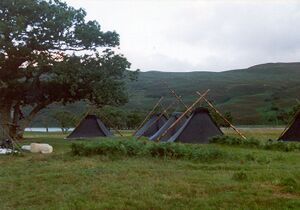Kohte
| This article does not cite any references or sources. Please help improve this article by adding citations to reliable sources. Unsourced material may be challenged and removed. (July 2011) |
The Kohte (usual English paraphrase: German black tent) is the typical tent of German Scouting and the German Youth Movement. It was developed about 1930 by Eberhard Koebel as a variation of the Sami lavvu and became very quickly popular within the Bündische Jugend. In 1935, its use was banned throughout Germany by Hitler Youth official Arthur Axmann; groups still using it were considered "cultural bolshevists" and prosecuted. After World War II, the Kohte was reintroduced in German Scouting and became the most used type of tent in German Scouting.
A typical Kohte accommodates a patrol of six to eight Scouts. Derived from the Kohte was the Jurte (yurt) as a larger tent used for larger groups. Both tents are designed to have an open fire within the tent.
External links
- 75 Jahre Kohte – mit der Freischarlilie fing es an Template:De icon; on the history of the Kohte
- Schwarzzeltarchiv Template:De icon; collection of materials on the Kohte, including instructions for buildup
- Fichtelgebirge District Scouts - Germany (English); Description of various Black Tents
